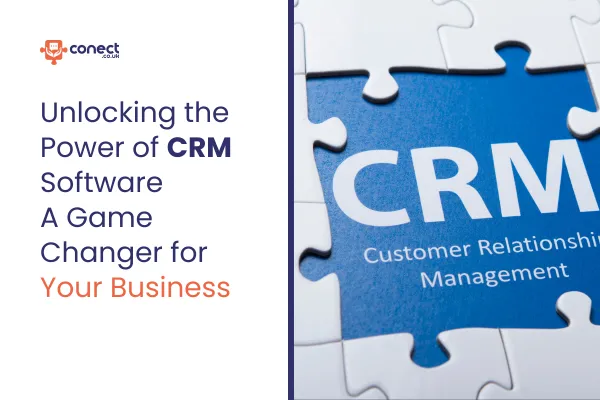
Unlocking the Power of CRM Software for Business Growth
Unlocking the Power of CRM Software: A Game Changer for Your Business
Customer Relationship Management (CRM) software has evolved beyond just a tool to manage customer data—it's now an essential part of modern business strategy. As businesses aim to stay ahead of the competition, the need to manage customer relationships effectively has become crucial. CRM software enables businesses to consolidate customer data, automate sales processes, and optimize interactions within a single platform. Whether your business is a startup or an established enterprise, CRM software plays a pivotal role in driving growth and enhancing customer relationships. In this article, we explore how CRM systems can transform the way you engage with customers, boost sales, and streamline your business operations.
1. What Is CRM Software, and Why Is It Important?
CRM software is a tool that helps businesses manage their interactions with both current and potential customers. By centralizing all customer-related information, businesses can track and analyze interactions, automate repetitive tasks, and ultimately provide better customer service. Whether your team is handling a customer's inquiry or closing a sale, CRM software ensures that all communication is logged, enabling a seamless flow of information across departments.
The importance of CRM lies in its ability to streamline business operations, improve customer experience, and facilitate data-driven decision-making. With CRM, businesses can transition away from manual record-keeping and leverage technology to ensure that customer data is always up-to-date and accessible. This empowers employees to respond to customer needs more quickly and accurately, ultimately leading to improved customer satisfaction and loyalty.
2. Key Features of CRM Software
CRM software offers a variety of features, each designed to improve different aspects of a business's customer relationship strategy. Some of the key features include:
Customer Data Management: One of the primary benefits of CRM is the ability to centralize all customer data, from contact details to interaction history. This allows businesses to access customer information at any point, making it easier to personalize communication and ensure timely responses.
Sales Automation: Sales teams spend a significant portion of their time on manual tasks such as follow-ups, lead tracking, and email marketing. CRM software automates these processes, allowing sales teams to focus on high-value activities, such as nurturing relationships and closing deals.
Customer Support Tools: CRM software provides tools for customer service teams, including helpdesk ticket tracking, live chat support, and knowledge bases. These tools make it easier for teams to manage customer issues, improving satisfaction and loyalty.
Analytics and Reporting: CRM systems also come equipped with analytics and reporting tools that provide valuable insights into customer behavior, sales trends, and marketing performance. These insights enable businesses to make informed decisions, optimize their marketing strategies, and accurately measure their return on investment (ROI).
3. How CRM Software Enhances Customer Relationships
Customer relationships are the lifeblood of any business, and CRM software plays a key role in nurturing those relationships. By tracking customer interactions across multiple channels, CRM systems provide a complete picture of a customer's journey. This enables businesses to engage with customers at the right time with relevant offers and personalized messages.
Moreover, CRM software improves communication across teams. Sales, marketing, and customer service teams can collaborate more effectively by sharing customer insights in real-time. This ensures that every interaction is consistent and tailored to the customer's needs, ultimately helping to build trust and foster loyalty.
Additionally, CRM software allows businesses to automate follow-up communications, schedule reminders for essential touchpoints, and segment customers for targeted marketing. This proactive approach ensures that customers are consistently engaged, leading to higher satisfaction and repeat business.
4. The Role of CRM in Sales Growth
CRM software plays a vital role in accelerating sales growth. One of the most significant advantages is sales pipeline management. CRM systems offer a visual representation of where leads are in the sales process, enabling sales teams to prioritize high-value opportunities. This enables them to focus their efforts on leads that are most likely to convert.
CRM also automates many aspects of the sales process, including follow-up emails and appointment scheduling. This reduces the chances of forgetting essential interactions, ensuring that no lead is left behind. By streamlining these tasks, sales teams can allocate more time to high-impact activities, such as engaging with prospects and closing deals.
Additionally, CRM systems improve sales forecasting by providing real-time data on sales trends, customer behavior, and historical performance. With these insights, businesses can make more accurate predictions, adjust their strategies, and set achievable sales targets.
5. Streamlining Marketing with CRM
Marketing efforts are more effective when they are personalized and targeted to the right audience. CRM software enables businesses to segment their customer base based on factors such as purchase history, demographics, and behavior. This segmentation enables more tailored marketing campaigns that resonate with specific customer groups.
CRM also aids in automating marketing tasks such as email campaigns, social media posts, and ad placements. By automating these processes, marketing teams can ensure that the right message reaches the right people at the right time.
Furthermore, CRM systems provide detailed analytics on campaign performance, enabling businesses to track open rates, click-through rates, and conversions. These insights enable ongoing optimization of marketing strategies, ensuring that campaigns are consistently aligned with customer needs and preferences.
6. The Benefits of CRM Software for Small Businesses
Small businesses often face challenges in managing customer relationships due to limited resources and personnel. However, CRM software provides small businesses with a cost-effective means to streamline operations and enhance customer engagement. With CRM, small business owners can automate tedious tasks, such as data entry, appointment scheduling, and follow-ups, allowing them to focus on more strategic initiatives.
CRM software also provides small businesses with powerful insights that were previously only available to larger organizations. By tracking customer behavior and sales trends, small businesses can make more informed decisions, improve customer satisfaction, and ultimately grow their business. Additionally, CRM tools are often scalable, meaning small businesses can expand their systems as they grow without the need for significant upfront investment.
7. The Impact of CRM Software on Employee Productivity
CRM software enhances employee productivity by streamlining tasks and improving collaboration. For example, sales teams no longer need to enter customer information or track leads on spreadsheets manually. With CRM, these tasks are automated, freeing up time for more value-added activities, such as relationship-building and problem-solving.
CRM also encourages collaboration across departments. By giving all teams access to the same customer data, CRM ensures that everyone—from marketing to sales to customer service—is on the same page. This reduces miscommunication and promotes a more unified approach to customer management.
As a result, employees are more efficient, tasks are completed more quickly, and customer issues are resolved more promptly. This boost in productivity can have a significant impact on overall business performance.
8. Overcoming Challenges with CRM Implementation
While CRM software offers numerous benefits, the implementation process can be challenging for some businesses. Common obstacles include data migration from legacy systems, employee resistance to change, and integration issues with other software tools.
To ensure a smooth CRM implementation, businesses must plan carefully and provide adequate training for employees. Additionally, it's essential to select a CRM system that integrates well with existing tools and workflows. By addressing these challenges proactively, businesses can maximize the effectiveness of their CRM software and minimize disruption during the implementation process.
9. Future Trends in CRM Software
As technology continues to evolve, so too does CRM software. The future of CRM appears promising, with trends such as artificial intelligence (AI), machine learning, and automation becoming increasingly integral to CRM systems. These technologies will enable businesses to predict customer needs, personalize interactions, and automate customer service tasks more effectively.
AI-powered CRM systems will also provide deeper insights into customer behavior, enabling businesses to create highly targeted marketing campaigns. Additionally, chatbots and virtual assistants are set to play a larger role in customer service, providing immediate responses to customer inquiries and resolving issues without human intervention.
FAQs
1. What are the key benefits of using CRM systems in business?
CRM systems enhance customer relationships, streamline business operations, and improve sales performance through automation and data-driven insights.
2. How does CRM software help with sales management?
CRM software helps sales teams track leads, automate follow-ups, and prioritize high-value opportunities, ultimately increasing conversion rates.
3. Can small businesses benefit from CRM software?
Yes, small businesses can automate repetitive tasks, manage customer data efficiently, and gain valuable insights to support growth with CRM tools.
4. What challenges can businesses face when implementing CRM systems?
Common challenges include data migration, employee resistance, and integrating CRM software with existing tools and processes.
5. How will CRM software evolve in the future?
Future CRM systems will incorporate AI, machine learning, and automation, providing more personalized customer interactions and more innovative decision-making tools.
Conclusion
CRM software is no longer a luxury; it has become a necessity for businesses. By streamlining operations, enhancing customer relationships, and providing valuable insights, CRM systems enable businesses to drive growth and improve efficiency. From automating sales processes to personalizing marketing campaigns, CRM software is a game-changer for businesses of all sizes. As technology continues to advance, CRM systems will become increasingly powerful, providing businesses with new ways to engage with customers and improve their performance. Investing in CRM software today is a strategic move that can lead to a brighter, more successful future for your business.

The All-In-One Solution to grow your business. Capture Free Leads And Conversationally Covert Them Into Customers!
Contact information
Address : Layton Lane, Rawdon, Leeds, LS19 6RG
Phone : +44 7859 775480
Email : [email protected]

